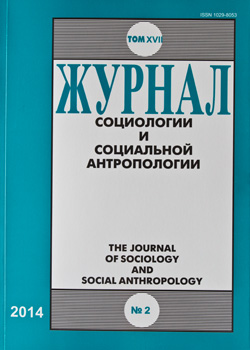Conceptual Resources of Civilizational Analysis for Understanding Russia’s Post-Soviet Transformations
Keywords:
civilizational analysis, modernization, modernity, intercivilizational encounters, civilizational identity
Abstract
This paper considers the theoretical and methodological backgrounds of the civilizational analysis perspective in contemporary sociology which compose an alternative framework for comprehension of the post-soviet transformations in Russia. This framework tends (tries) to overcome the heuristic limitations of the normative approach to modernization with its universalistic vision of modernity and some deterministic and reductionistic models of Russian modernization. Some of the potential applied aspects of this approach are considered in the paper. We see the post-soviet ‘encounter’ with the Western modernity and the reception of the Western cultural and institutional structures in different social domains to be a crucial driving force for the modernization and transformation processes that have taken place in Russia. These contacts are considered in terms of the ‘intercivilizational encounters’, interactions and responses between different historical ‘civilizational complexes’ and their respective visions of modenity. Such approach is able to uncover hidden cultural patterns, ‘structures of consciousness’ and inherent institutional conditions, which have shaped the way in which the Western cultural and institutional borrowings have been interpreted, selected and modified. A legacy of the Soviet modernization project as well as different, often conflictual interpretations of the Western cultural institutional forms are among other important factors in the dynamics of Russian modernization and transformation.
Published
2014-02-20
How to Cite
Prozorova, J. (2014). Conceptual Resources of Civilizational Analysis for Understanding Russia’s Post-Soviet Transformations . ZHURNAL SOTSIOLOGII I SOTSIALNOY ANTROPOLOGII (The Journal of Sociology and Social Anthropology), 17(2), 70–87. Retrieved from http://jourssa.ru/jourssa/article/view/626
Section
Historical Sociology and Civilizational Analysis

